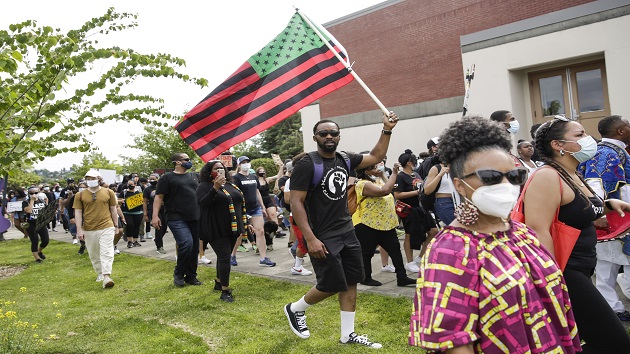(NEW YORK) — Opal Lee, 95, has spent much of her life advocating for civil rights. When she was just 12, her family home was vandalized and set ablaze by white supremacists, none of whom were arrested.
It led her down a lifetime of trying to force the nation to pay respect to those impacted, oppressed or killed by racism throughout U.S. history. Each year on Juneteenth, she and her family in Texas go on a picnic and celebrate the day in 1865 when enslaved Black people in Galveston, Texas, learned they had been freed over two years after the Emancipation Proclamation took effect.
In 2016, Lee went to Washington, D.C., and led a 2.5-mile march to symbolize the 2.5 years it took for the Emancipation Proclamation to be enforced in Texas, and to free the final enslaved Black people.
The joyous day, filled with love and comradery in the Black community, was one she wanted to turn into a federal holiday.
Social activism can take many forms: protests, petitions, boycotts — but for some, joy can be also a revolutionary tool against systems of oppression. Black joy, as an act of resistance against white supremacy, takes center stage on Juneteenth.
Lee’s grandaughter, Dione Sims, who is also a civil rights advocate, has been helping her in the fight and says joy is key to bringing the movement forward.
“Folks usually think that to be an activist, you have to be negative in protesting and marching and, but when you come together and you celebrate and you commemorate Juneteenth, it is a form of social awareness,” Sims told ABC News.
“It is a show of support, not just for the African American community, but the fact that Juneteenth represents freedom for all,” she said.
In 2021, Lee and Sims stood with President Joe Biden when he officially made the commemorative day a federally recognized holiday.
“You know when you smile a lot and your cheekbones hurt? That’s how it was that day, because I’m just smiling, seeing her having a dream fulfilled,” Sims said. “A lot of times we have dreams, and we don’t get to see the culmination of it until maybe after a person has passed on.”
Shaonta’ Allen, a sociology professor at Dartmouth University, says that joy is the opposition to widespread anti-Blackness and racism seen in the U.S. It’s inherently resistant to oppressive forces, she says.
“When Black communities and Black individuals decide to identify for themselves and provide value in Blackness, when everything around them tells them that they should not value blackness – That’s where we see that opposition to this widespread racism and inequality,” Allen said.
She said Juneteenth, as well as June’s Pride month and other heritage month celebrations, are great examples of celebrating as a form of protest.
“We see other communities, intentionally drawing on self validation, self valuation, self definition, rather than more dominant notions of what their community is and how their communities should be viewed,” Allen said.
In celebrating the vibrancy and comradery of Juneteenth, Black communities refuse to accept suffering against oppression.
For Sims, joy has been a motivating factor in continuing Lee’s legacy. She said it’s what helps keep activists going.
“Black freedom and Black emancipation in America is definitely something that Black communities are excited about and have been, but we also celebrate with caution, because we know that there’s still a lot of work to do to,” Lee said.
Copyright © 2022, ABC Audio. All rights reserved.


